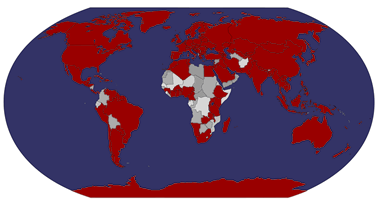Tirana is the capital and the largest city of Albania. Modern Tirana was founded in 1614 by Sulejman Pasha. Tirana became Albania's capital city in 1920. As of 2008, the city's urban population was officially estimated at 618,431.
The area now occupied by the city of Tirana has been populated since Paleolithic times dating back 10,000 to 30,000 years ago. On February 8, 1920, Tirana was chosen as the temporary capital of Albania, which had acquired independence in 1912, by the Congress of Lushnja. The city retained that status permanently on December 31, 1925. From 1920 to 1924 Tirana experienced attacks from the army of the Kingdom of Serbs, Croats and Slovenes and the forces of Zogu at the Shkalla e Tujanit (Step of Tujan).
In 1939, Tirana was captured by Fascist forces. In November 1941, Enver Hoxha with other Albanian communists founded the Communist Party of Albania. The town became the center of the Albanian communists' in mobilizing the people of Tirana to fight against the Italian fascists and later Nazi Germans, while spreading ideological propaganda. The town was liberated after a fierce battle between the Communists and the people of Tirana against the German forces, on November 17, 1944. The Nazis eventually withdrew and the communists seized power.
Following the communist takeover, the city experienced a significant period of development. In terms of urbanization, the city witnessed the creation of socialist-styled apartment complexes and factories. In the 1960s, the historical identity of the city faced a critical moment as the central square was redesigned. As a result, a number of buildings of cultural and historical significance were demolished to make way for the formation of present-day Skanderbeg Square.
The post communist period is described to have been the worst one in terms of the urban development of the city. Tirana experienced a chaotic development as high rise buildings started to be constructed without planning, and illegal structures rose on public areas. New informal districts started to form around the city as internal migrants gathered from around the country. During this period Tirana was transofrmed from a centrally planned economy to a market oriented economy. All the builidings and the apartaments were denationalized. A modern water-supply system and electrical-supply system was build during 1992-1996. These systems form the backbone of the modern Tirana.
The city experienced radical changes at the turn of the millennium. In 2000, a massive political campaign began to beautify and to liberate public space, which was previously occupied by illegal commercial establishments. The campaign, called Return to Identity, included the transformation of river banks, of parks, and of other public structures to their state before 1990. The overall infrastructure has improved as considerable number of roads have been reconstructed. More parks and squares have also been built giving Tirana a more "European" look. Common spaces between apartment buildings have been targeted by a subsequent campaign in bringing back green spaces and a vast number of illegal buildings have been demolished. It is observered that some existing green spaces are used for the construction of skyscrapers and multi-functional centers. Apartment buildings are being built on grounds of former residential houses.

As I said earlier, the card was mailed from Italy. The stamp is great, though. It's Italy's contribution to Europa 2010 stamp, this year's theme being children's books. Geronimo Stilton is a best-selling children's book series in Italy. In the series, the title character is a talking mouse who lives in New Mouse City on Mouse Island. A best-selling author, Geronimo Stilton works as a journalist for the fictional newspaper The Rodent's Gazette.


 Maroon
Maroon 










































































































































































No comments:
Post a Comment